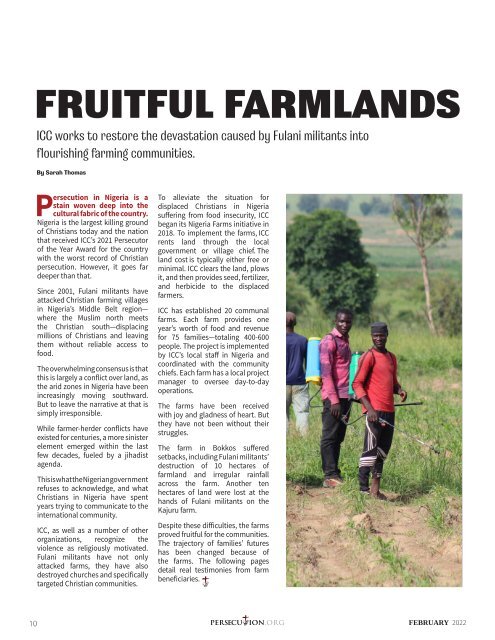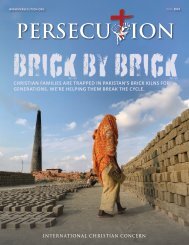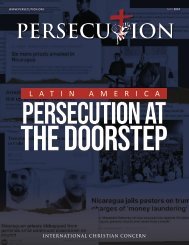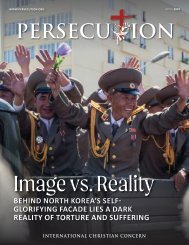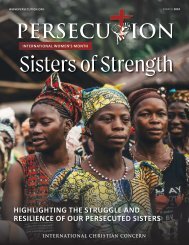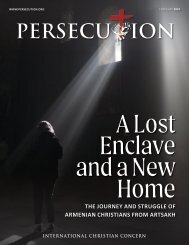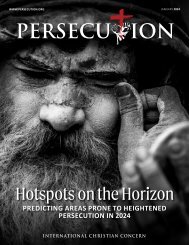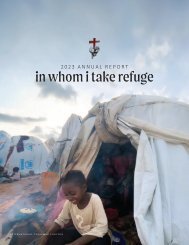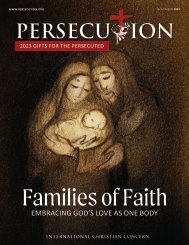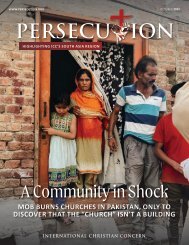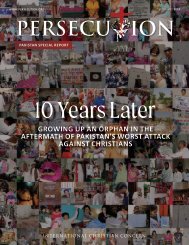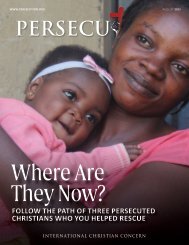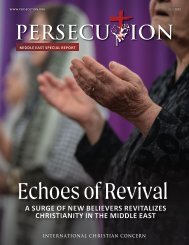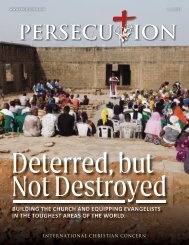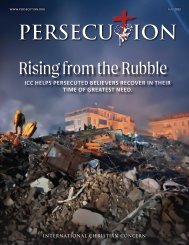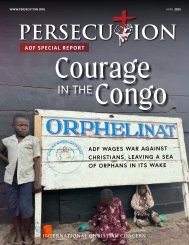February 2022 Persecution Magazine
Create successful ePaper yourself
Turn your PDF publications into a flip-book with our unique Google optimized e-Paper software.
FRUITFUL FARMLANDS<br />
ICC works to restore the devastation caused by Fulani militants into<br />
flourishing farming communities.<br />
By Sarah Thomas<br />
<strong>Persecution</strong> in Nigeria is a<br />
stain woven deep into the<br />
cultural fabric of the country.<br />
Nigeria is the largest killing ground<br />
of Christians today and the nation<br />
that received ICC’s 2021 Persecutor<br />
of the Year Award for the country<br />
with the worst record of Christian<br />
persecution. However, it goes far<br />
deeper than that.<br />
Since 2001, Fulani militants have<br />
attacked Christian farming villages<br />
in Nigeria’s Middle Belt region—<br />
where the Muslim north meets<br />
the Christian south—displacing<br />
millions of Christians and leaving<br />
them without reliable access to<br />
food.<br />
The overwhelming consensus is that<br />
this is largely a conflict over land, as<br />
the arid zones in Nigeria have been<br />
increasingly moving southward.<br />
But to leave the narrative at that is<br />
simply irresponsible.<br />
While farmer-herder conflicts have<br />
existed for centuries, a more sinister<br />
element emerged within the last<br />
few decades, fueled by a jihadist<br />
agenda.<br />
This is what the Nigerian government<br />
refuses to acknowledge, and what<br />
Christians in Nigeria have spent<br />
years trying to communicate to the<br />
international community.<br />
ICC, as well as a number of other<br />
organizations, recognize the<br />
violence as religiously motivated.<br />
Fulani militants have not only<br />
attacked farms, they have also<br />
destroyed churches and specifically<br />
targeted Christian communities.<br />
To alleviate the situation for<br />
displaced Christians in Nigeria<br />
suffering from food insecurity, ICC<br />
began its Nigeria Farms initiative in<br />
2018. To implement the farms, ICC<br />
rents land through the local<br />
government or village chief. The<br />
land cost is typically either free or<br />
minimal. ICC clears the land, plows<br />
it, and then provides seed, fertilizer,<br />
and herbicide to the displaced<br />
farmers.<br />
ICC has established 20 communal<br />
farms. Each farm provides one<br />
year’s worth of food and revenue<br />
for 75 families—totaling 400-600<br />
people. The project is implemented<br />
by ICC’s local staff in Nigeria and<br />
coordinated with the community<br />
chiefs. Each farm has a local project<br />
manager to oversee day-to-day<br />
operations.<br />
The farms have been received<br />
with joy and gladness of heart. But<br />
they have not been without their<br />
struggles.<br />
The farm in Bokkos suffered<br />
setbacks, including Fulani militants’<br />
destruction of 10 hectares of<br />
farmland and irregular rainfall<br />
across the farm. Another ten<br />
hectares of land were lost at the<br />
hands of Fulani militants on the<br />
Kajuru farm.<br />
Despite these difficulties, the farms<br />
proved fruitful for the communities.<br />
The trajectory of families’ futures<br />
has been changed because of<br />
the farms. The following pages<br />
detail real testimonies from farm<br />
beneficiaries.<br />
10 PERSECU ION.ORG<br />
FEBRUARY <strong>2022</strong><br />
INTERNATIONAL CHRISTIAN CONCERN


